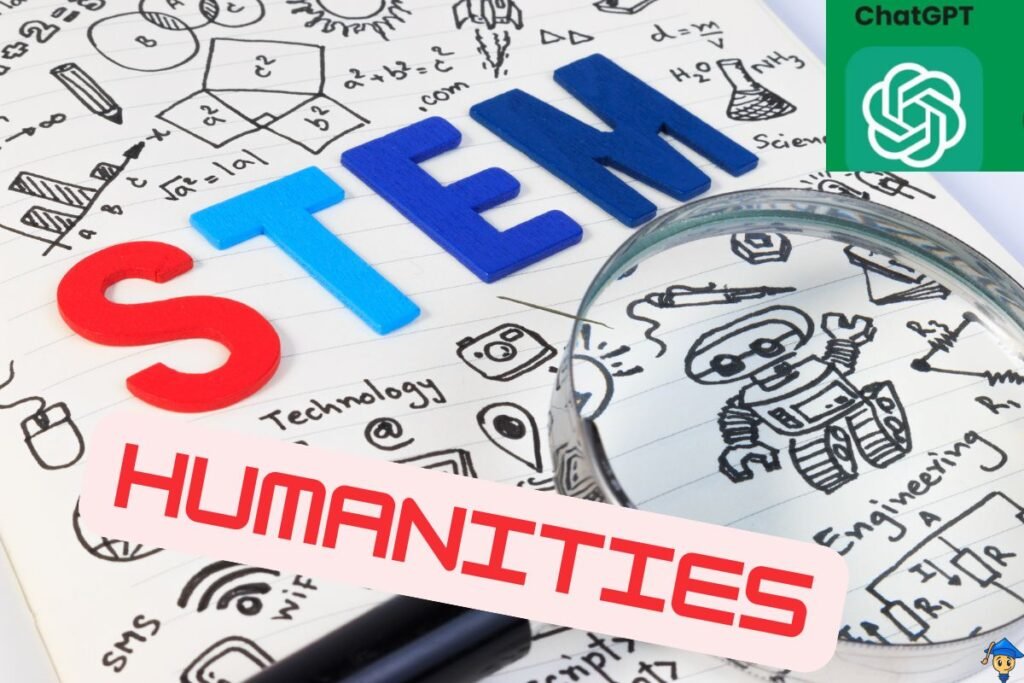In the competitive realm of NEET(UG) preparation, creating effective mock test papers is crucial for students to excel. Fine-tuned ChatGPT prompts can significantly aid in generating high-quality mock tests for subjects such as Physics, Chemistry, Botany, Zoology and combined.
In this blog post, you will explore how to leverage ChatGPT to create comprehensive, challenging and UNLIMITED mock test papers at ZERO COST.
Dear Children, first thing first.
Firstly, you should understand the NEET(UG) syllabus, subjectwise question patterns, marking scheme and chapter-wise weightage.
Let’s dive in!
Physics
Physics is a core component of the NEET(UG) exam, requiring a balance of conceptual understanding and problem-solving skills. By fine-tuning ChatGPT prompts, educators can generate a variety of questions that cover essential topics like Mechanics, Thermodynamics, and Electromagnetism. For instance, prompts can be designed to create multiple-choice questions that test fundamental concepts as well as numerical problems that challenge students’ application skills.
Chemistry
Chemistry encompasses both Organic and Inorganic Chemistry along with Physical Chemistry. Fine-tuned ChatGPT prompts can help in producing diverse question types, including reaction mechanisms, periodic table trends, and thermodynamic principles. These prompts ensure that students are exposed to a wide range of questions, enhancing their understanding and ability to tackle different types of problems in the exam.
Botany
Botany, a significant part of the Biology section, requires students to have a deep understanding of plant physiology, genetics, and ecology. With fine-tuned ChatGPT prompts, it’s possible to generate questions that cover various aspects of plant biology, from the structure of plant cells to the processes of photosynthesis and transpiration. These questions can aid students in mastering the subject thoroughly.
Zoology
Zoology covers diverse topics related to animal physiology, genetics, and evolutionary biology. ChatGPT prompts can be fine-tuned to produce questions that test students’ knowledge on animal anatomy, reproductive systems, and ecological interactions. This comprehensive approach ensures that students are well-prepared for any zoology-related questions in the NEET(UG) exam.
Fine-Tuned ChatGPT Prompts for Creating NEET(UG) Mock Test Papers
Physics Prompts:
“Create a set of 10 challenging multiple-choice questions for NEET(UG) Physics on the topic of Mechanics. Ensure questions cover concepts like Newton’s laws, work, energy, and power.”
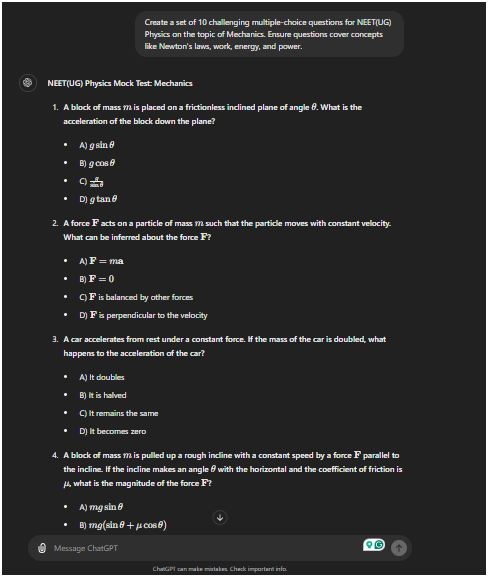
Dear friends now set a time (10min) on your clock and start solving this paper. After solving this paper, submit your answer to ChatGPT with this prompt immediately after the above output:
“Let us evaluate the answers provided to you: 1(a), 2(b), 3(c) …”
See the output generated with OpenAI’s ChatGPT chatbot:
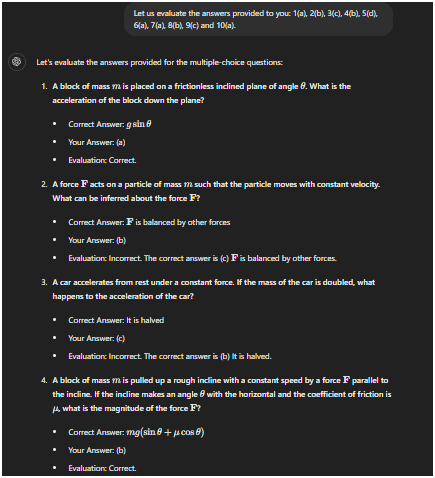
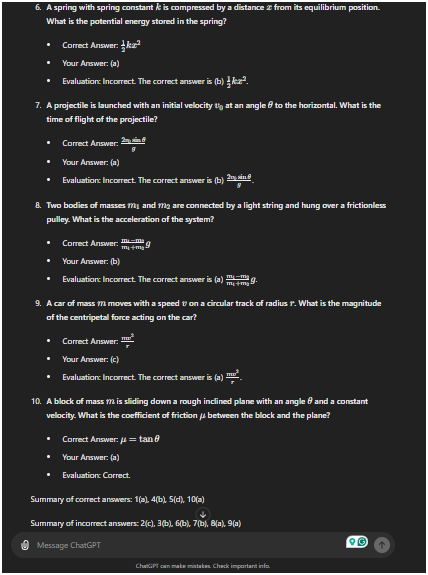
If you want explanations for the answers, then write this prompt:
“Please give me the explanations.”
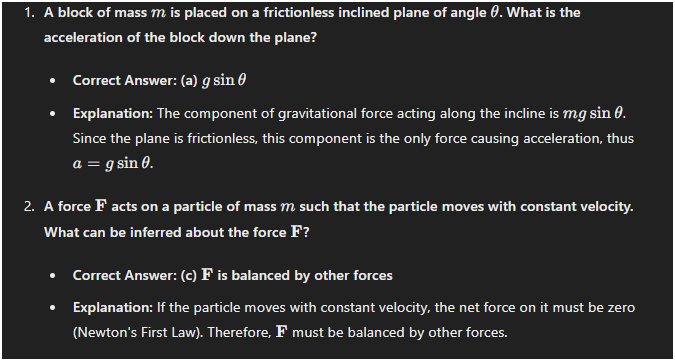
If you don’t want questions again, then modify your prompt like this:
“Please give me the explanations. Take out questions.”
“Design a NEET(UG) mock test section with 15 questions focusing on Thermodynamics. Include questions on the laws of thermodynamics, heat engines, and entropy.”
“Generate a series of 12 multiple-choice questions on Electromagnetism for NEET(UG) preparation. Cover topics such as magnetic fields, Faraday’s law, and AC circuits.”
Chemistry Prompts:
“Prepare 10 multiple-choice questions for a NEET(UG) mock test in Physical Chemistry, focusing on Chemical Kinetics and Chemical Equilibrium.”
“Create a set of 15 questions on Organic Chemistry for NEET(UG) practice, including topics like hydrocarbons, functional groups, and reaction mechanisms.”
“Develop 12 questions on Inorganic Chemistry for NEET(UG) mock tests. Ensure questions cover coordination compounds, periodic table trends, and chemical bonding.”
Botany Prompts:
“Generate 10 multiple-choice questions for NEET(UG) Botany on the topic of Plant Physiology. Include questions on photosynthesis, respiration, and plant hormones.”
“Design a NEET(UG) mock test section with 15 questions focusing on Genetics and Evolution in Botany. Cover Mendelian genetics, chromosomal theory, and evolutionary biology.”
“Create a set of 12 questions on Cell Biology for NEET(UG) Botany practice. Include questions on cell structure, function, and cell cycle.”
Zoology Prompts:
“Prepare 10 multiple-choice questions for a NEET(UG) mock test in Zoology, focusing on Human Physiology. Include topics like digestion, respiration, and circulation.”
“Generate 15 questions on Reproduction and Development in Animals for NEET(UG) Zoology practice. Cover topics such as reproductive systems, embryonic development, and reproductive health.”
“Design a NEET(UG) mock test section with 12 questions on Ecology and Environment in Zoology. Include questions on ecosystems, biodiversity, and environmental issues.”
Combined Mock Test Prompts:
“Create a comprehensive NEET(UG) mock test with 50 multiple-choice questions, divided equally among Physics, Chemistry, Botany, and Zoology. Ensure the questions cover key topics from each subject.”
“Develop a full-length NEET(UG) practice test with 45 questions from each subject: Physics, Chemistry, Botany, and Zoology. Include a mix of easy, medium, and difficult questions to simulate the actual exam.”
“Generate a set of 100 multiple-choice questions for a NEET(UG) mock test, with 25 questions each for Physics, Chemistry, Botany, and Zoology. Ensure a balanced coverage of the syllabus for each subject.”
These prompts will help you to create diverse and comprehensive mock test papers for NEET(UG) preparation, covering key topics across Physics, Chemistry, Botany, and Zoology.
Make a solid study plan and kick the coaching centres, it’s a TRAP!
Remember, SELF-STUDY is the key to success. Don’t Be Part of the Crowd!
Conclusion
Fine-tuned ChatGPT prompts are a valuable tool for creating robust NEET(UG) mock test papers. By incorporating tailored questions in Physics, Chemistry, Botany, and Zoology, students can be well-equipped with the rigorous practice needed to excel in the exam at no cost and hazards.
Embracing this technology can transform the preparation process, making it more efficient and effective.
Happy Preparation!





